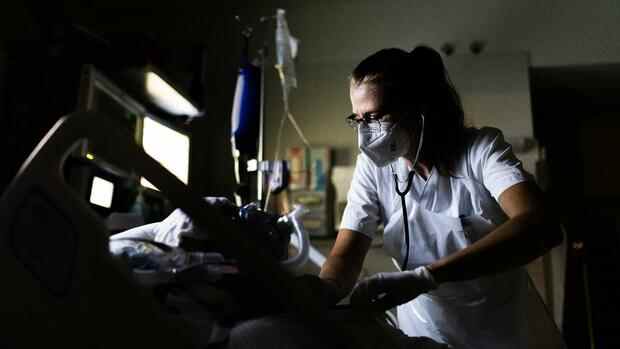Many hospitals report high staff shortages.
(Photo: dpa)
Dusseldorf Corona-related staff shortages are currently higher than at any time since the outbreak of the pandemic: There are 500 employees at the University Hospital in Münster – three times as many as in winter. This has consequences: 20 percent of the planned interventions have to be postponed, operating theaters are closed.
Almost all German hospitals experience such bottlenecks. 75 percent therefore have to limit their range of care, says Gerald Gass, head of the German Hospital Society. The numbers are well above the usual values. “In some cases, a failure rate of 50 percent is reported on the wards.”
Critical infrastructure companies are currently particularly affected by the Omicron wave. But the consequences of the highly contagious virus variant are also noticeable in companies, according to a Handelsblatt survey. Large corporations with hygiene concepts in the factories and permanent home offices for office workers are able to largely compensate for the absences.
The situation is more precarious in medium-sized companies: According to a representative study by KfW, one in four small and medium-sized companies complains about the burden of staff shortages due to the pandemic – an increase of ten percentage points since autumn. The manufacturing industry is particularly affected, also because working from home is more difficult to implement there.
Top jobs of the day
Find the best jobs now and
be notified by email.
Although the number of infections is declining, Corona is hitting Germany harder than ever. The Robert Koch Institute counts over four million active infections – a value that has never been registered before. Among them are many employees who are ill or in isolation and cannot go to work, according to health insurance figures: At Barmer, over 50,000 insured persons are on sick leave because of Covid-19 – twice as many as in December and four times as many as in the first pandemic waves. The AOK Nordost also reports sick leave twice as high as the average for the years 2019 to 2021.
Lots of failures in clinics
This has a particular effect on the hospitals: “The worst case scenario for every doctor is triage”, i.e. the prioritization of patients, according to the Braunschweig Clinic. “At the moment we are less away from that than discussed in the waves before.” There are six percent of the doctors and twelve percent of the nurses missing. In the Berlin Charité, the failure is eight percent, in the Hamburg University Hospital Eppendorf, operations that have been planned for a long time and are not urgent have to be postponed.
While the hospitals used to complain about too many Covid patients, there are now problems with their own staff – especially in Bavaria. The Munich University Hospital has to do without 300 to 500 employees, and a fifth of the beds cannot be occupied. At the Freising Clinic, every tenth employee is absent. Nurses are brought back from vacation and fee-based doctors are hired. “It gets to the substance and nerves of all employees,” it says. Because every fifth doctor in Starnberg is absent, the clinic keeps contacting the control center to withdraw from emergency care. The situation is tense.
Other areas of critical infrastructure are also affected: the federal police are missing 3,000 officers due to Corona – twice as many as at the beginning of the Omicron wave. Five percent of the officials in the fire brigades in Munich and Frankfurt are absent, and seven percent in Hamburg. In addition, many emergency services can only use respiratory masks again after an infection weeks later – so the burden continues to increase.
Effects in the corporations lower
For large companies, the impact seems to be less. Many companies such as BASF, Allianz, Henkel, Brenntag, Siemens or the B2B trading company Berner are currently reporting more infections. But there are only slight or no effects on day-to-day business, assure Dax companies and large family businesses. The fact that Omikron is crippling the economy, as initially feared, does not seem to be the case so far.
>>> Also read: The home office obligation ends – Germany’s offices still remain empty
However, the corporations are not completely immune: The engine manufacturer MTU has to reschedule employees internally “in order to counteract bottlenecks that occur selectively”. At Telekom, there are sometimes delays in the field service. Volkswagen had already discontinued individual shifts in February due to increased incidences.
Companies without production have it easier in the current situation. Because many Omicron infections are mild, those affected can “usually work from their home office,” as SAP reports. Employees are also obliged to do so under labor law. At Allianz, employees should decide for themselves whether they “feel fit enough to work from home” in the event of a mild course. Eon urges employees to “cure even mild symptoms in peace”.
In view of the falling number of infections, many companies expect the situation to ease. Sartorius, RWE, Bayer and BMW report that the number of infected employees is declining. Hospitals are more skeptical: The Munich University Hospital fears that the easing of staff shortages will remain the same or continue to increase. If the number of Covid patients also goes up, “it will be really tight for the other patients”.
More: “I made a mistake”: Lauterbach is moving away from voluntary corona isolation

